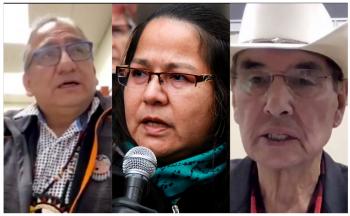Image Caption
Summary
Local Journalism Initiative Reporter
Windspeaker.com
In an unexpected move, two chiefs who introduced a resolution at the Assembly of First Nations meeting in favour of federal legislation to implement the United Nations Declaration on the Rights Indigenous People pulled their support.
Both Stat’skin te Secwepemc Neskonilith Chief Judy Wilson and Kebaowek First Nation Chief Lance Haymond told chiefs on Dec. 9, the second day of the AFN annual general assembly, that too little time had been allotted in the debate to address the many concerns raised about Bill C-15, so they could not keep the resolution alive.
“It’s rather unfortunate that this forum and the mechanisms that are being used to hold this assembly is limiting a very important debate on a piece of legislation. As a chief, I want UNDRIP but I want the best piece of legislation receiving Royal Assent,” said Haywood. “I believe strongly that we need to do the best work on the front end, because if we don’t do good work and have a good front end in this legislation we’re going to be challenged with getting the best outcomes we have on the back end.”
Haywood said it was “deplorable” that on such an important issue “with such a divergence of opinion on the legislation that we are not facilitated the time to have broader debate and work towards reaching consensus, because at the end of the day that is what’s going to be required.”
Wilson also expressed concern with the “shutting down” of discussion at the AGA.
“The AFN is the chiefs’ assembly and the chiefs should be allowed to have their discussions and concerns,” said Wilson.
Rules of the assembly, said facilitator Harold Tarbell, clearly indicated that a mover can withdraw a resolution.
Removal of the resolution came after a lengthy description of the legislation from Chief Wilton Littlechild, who chaired an expert committee on UNDRIP legislation that was established by the AFN.
Littlechild emphasized that the bill was stronger than Bill C-262, the private members bill introduced by former NDP MP Romeo Saganash to move implementation of UNDRIP forward. That bill was defeated in the Senate in 2019. He said C-15 included 24 enhancements on Saganash’s bill, as well as a “positive” preamble.
Littlechild emphasized the first paragraph in the preamble which read, in part, that UNDRIP “‘provides a framework’ – should be the framework – ‘for reconciliation, healing and peace as well as harmonious and cooperative relations based on the principles of justice, democracy, respect for human rights, non-discrimination and good faith’.”
Littlechild said C-15 had “room for improvement” and pointed to a number of concerns, including the three years the government is proposing it will take to create an action plan for implementation.
“Canada cannot afford to wait that long to address systemic racism and violence against Indigenous women and girls,” he said.
However, chief proxy Judith Sayers said the bill did not substantially address these issues.
“I think the lack of the term racism is a critical error in this legislation. Discrimination is fine, but it needs to be inclusive of racism…. Why aren’t we talking racism and add discrimination in there because we all know that is the root of the problem and if we ignore race then we are ignoring the issues that face Indigenous people,” she said.
Batchewana First Nation Chief Dean Sayers and Pimicikamak Okimawin Chief David Monias both expressed concern about First Nations sovereignty.
“Canada will exercise veto over our determinations and our decisions, which is inherent rights that we have. So I would look forward to more empowering our assertion of law and we take the unextinguished position of the first laws on the land,” said Sayers.
He reiterated that the Association of Iroquois and Allied Indians is affirming their sovereignty and right to self-determination, and had refused to be engaged in reviewing Bill C-15.
“This bill is for Canada and the provinces … and how they deal with our people. It’s not for Aboriginal people because we ourselves already have our own laws. All have our traditions and our customs that we have to implement and this law would only give rise to the government of Canada and the provincial governments, as well as the territories, to recognize what we have always claimed, that we are sovereign nations; that we govern ourselves,” said Monias.
Littlechild said introduction of the legislation was only the first step.
That was something stressed by Justice Minister David Lametti in his address at the AGA the previous night.
“I want you to know there will be more time to contribute to the development of C-15 as the bill is considered in Parliament. We have always considered the tabling in the House of Commons as a step along the way in the larger consultative and co-development process. I am always willing to hear and discuss your concerns,” said Lametti.
Prime Minister Justin Trudeau committed to introducing UNDRIP legislation by the end of 2020 and Lametti introduced it last week.
Wilson said BC chiefs participated in a town hall meeting, but they didn’t have the legislation to look at as they were giving their input.
Judith Sayers also categorized talks with Lametti as not substantive.
“This has been ongoing for so many years that there should have been talks ongoing, and I also think that the government is using COVID as an excuse,” said Sayers.
The onset of the coronavirus pandemic and control measures that brought in-person consultation sessions to a halt greatly impacted feedback from First Nations, Métis and Inuit.
Wilson said a resolution supporting implementation of UNDRIP should be brought back for consideration to the chiefs’ assembly in July 2021.
Local Journalism Initiative Reporters are supported by a financial contribution made by the Government of Canada.

